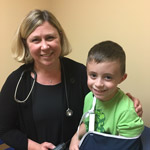A common call we get in the office is from the panicked parent of a young child who has stuck a toy or foreign object in an ear, nose, or mouth.
When can you handle it on your own, and when is an office visit warranted? Here’s what we recommend.
For Toys in the Ear or Nose:
Children are natural sensory explorers. Unfortunately, sometimes their exploration goes awry, and your child approaches you with a toy or other foreign object in their nose or ear. Foreign bodies of the mouth or ear are most common in kids under the age of 5, but it’s not uncommon for older kids to “experiment,” as well. If you can see the toy or other foreign body in your child’s ear or nose:
- Try removing the object gently with tweezers, if it’s large enough. Tweezers may push smaller objects further up the nose or into the ear. Do not use Q tips or fingers.
- See if your child can blow it out of their nose on their own. Encourage them not to sniff or pick.
- If you cannot pull the object out gently and easily with tweezers, call our office. If your child is having difficulty breathing or the foreign object is a button battery, go to your nearest emergency room.
For Swallowed Toys:
If your child swallowed something small and not sharp, such as a plastic bead, there is no need to rush them to the office. Visit the office immediately if your child swallowed a battery or something sharp. If the child swallowed something metal like a coin or ring, we recommend an office visit. If you are unsure of what your child swallowed, bring them in. In most cases, most things that make it to the stomach go out naturally through stool.
Signs of medical emergencies include drooling, stomach pain, vomiting, gagging, not eating, and wheezing.
If you do bring your child to the office, one of the first things we will do is determine what they have swallowed and where it is, which may require an x-ray. From there, we can make more specific recommendations.
Swallowing toys and foreign bodies are common medical complaints. In these cases, prevention is the best medicine. Ensure your children are playing with age-appropriate toys and keep all sharp objects and batteries out of a child’s reach. Always err on the side of caution and call us if you have any questions or concerns.
The information and content on our website should not be used as a substitute for medical treatment or advice from your doctor.





